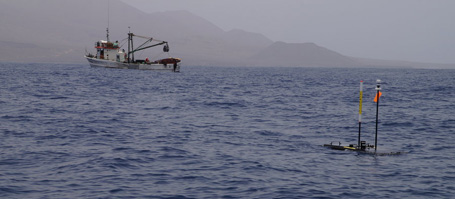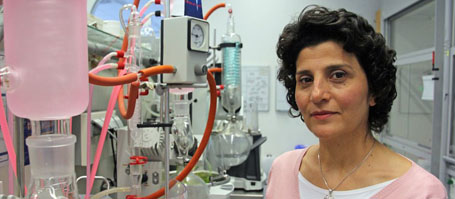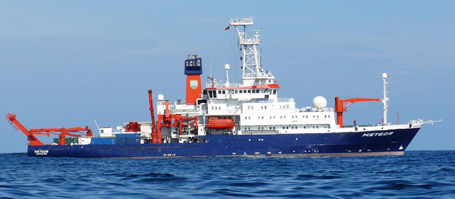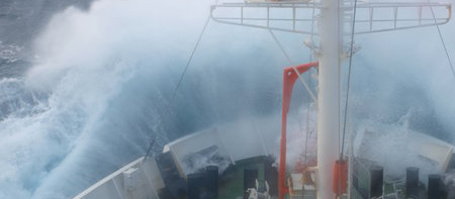The EU is funding AtlantOS as part of its framework programme "Horizon2020" with 21 million euros over a period of four years. The project is coordinated by GEOMAR Helmholtz Centre for Ocean Research Kiel.
The Atlantic Ocean is a major trade route, provides the oxygen we breathe, most fish we eat and is responsible for the mild climate in northern Europe. Environmental change causes the ocean to warm, sea level to rise, fish populations to decline and migrate, the water to become more polluted, more acidic, deoxygenized and less biodiverse. These and other influences of the Atlantic Ocean on the coastal states and continents are immense. Therefore, it is important to accurately observe its current condition, assess past changes and to predict future developments where possible. As part of the "Horizon2020" research framework programme, the European Union is supporting the AtlantOS project with 21 million over a period of four years to set up a more integrated, more effective, and more sustainable observing of the Atlantic Ocean. 62 partners, including research institutes, universities, research networks and private companies from 13 European and five non-European countries cooperate to improve the current systems. AtlantOS is coordinated by oceanographer Prof. Dr. Martin Visbeck from the GEOMAR Helmholtz Centre for Ocean Research Kiel (Germany).
Researchers in Europe, the USA, Canada, Brazil and South Africa and other Atlantic-bordering countries are already strongly engaged in observing the ocean in their exclusive economic zones and beyond. Together they support the Global Ocean Observing System (GOOS) which coordinates global sustained ocean observations including satellites, freely drifting floats, fixed observatories, as well as ship-based systems. “However, a lot of measurements are still made on a short-term base or are restricted to a single issue," says Professor Visbeck, "the data is not necessarily compatible with other measurements and, in some cases not freely available.”
Furthermore, data from the deep Atlantic ocean are still scarce. “Studies in recent years have repeatedly shown that even processes in the deep sea have an impact on the marine ecosystems and on climate in Africa, Europe or America," says Professor Visbeck. Last but not least there have been not enough interactions between the physics, chemistry and ecology but also between open-ocean and coastal observing. "The ocean is a highly complex and interdependent system in which all components are closely linked," says Visbeck, “our observational efforts need to reflect that also”.
The AtlantOS project partners want to ensure that future measured data will be more compatible by defining common standards. At the same time, they fill gaps in the existing observing systems. “However, we can not and need not to build a completely new observing network. It is all about connecting the existing infrastructure and infuse modern technology and use the whole system in a more efficient and integrated way,“ says Visbeck. This includes also more measurements of biological and chemical parameters.
In 2013, the United States, Canada and the EU have committed themselves to strengthen their cooperation in the sustainable exploration of the Atlantic by signing the "Galway Statement on Atlantic Ocean Research Cooperation". The aim of this cooperation is a better understanding of the Atlantic Ocean and a more collaborative and sustainable management of its resources. “AtlantOS is one of the first major projects which aims to support this agenda. Therefore our project includes a strong transatlantic component and we have partners such as the Woods Hole Oceanographic Institution from USA or the Dalhousie University in Halifax from Canada,” says project coordinator Martin Visbeck.
The first meeting with more than 130 representatives of the project partners will be held in Brussels from 10 to 12 June. During this kick-off meeting the details of the work program will be presented and the overarching goals discussed. The first day includes a plenary session which will discuss expectations and concerns about sustained ocean observations and what support the AtlantOS project can provide to European and particularly non-European partners.
“We have set ourselves very ambitious goals. But the relevance of the Atlantic for Europe is too significant to explore it only in bits and pieces. We need more national commitment and increased capabilities to ensure more effective, fit-for-purpose and sustainable ocean observing as a permanent basis for future marine research and information product delivery,” says Professor Visbeck.
Links:
www.atlantos-h2020.eu the AtlantOS project
Contact:
Jan Steffen (GEOMAR, Communications & Media), Tel .: 0431 600-2811, presse@geomar.de
…



